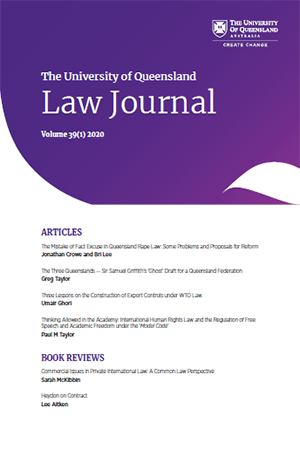Abstract
This article considers the role of the excuse of mistake of fact in Queensland rape and sexual assault law. We argue that the excuse has undesirable and socially regressive consequences by allowing reference to factors such as the complainant’s social behaviour, relationship to the defendant or lack of overt resistance that are at odds with the definition of free and voluntary consent. The excuse has also led to problematic results in cases involving impaired capacity (such as intoxication, mental incapacity or linguistic incapacity) by the defendant or the complainant. We canvass two potential reforms aimed at addressing these issues. The first would render the excuse inapplicable to the issue of consent in rape and sexual assault cases, while the second would limit the excuse to address its most troubling outcomes.
